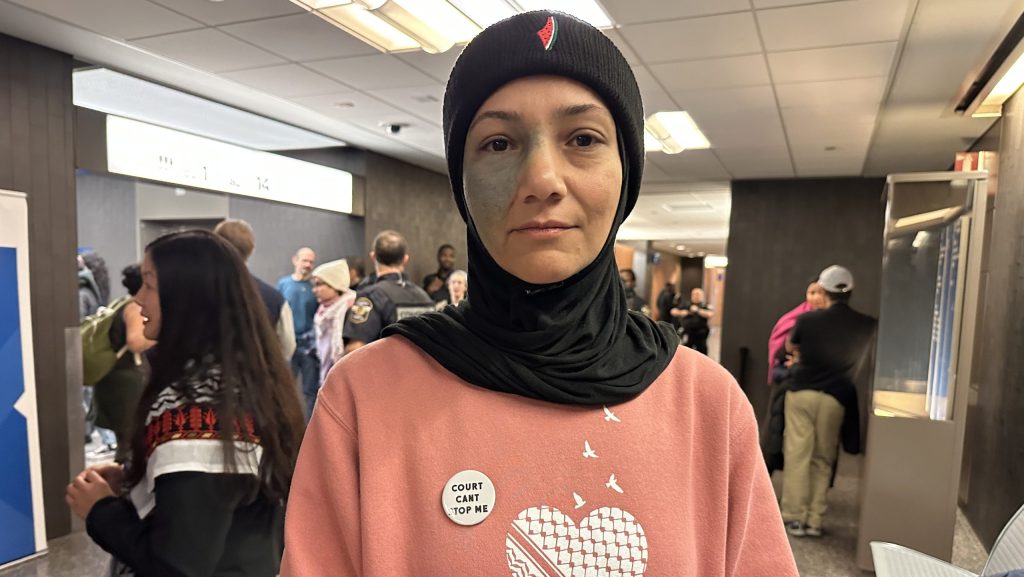Montreal elementary school teacher pleads guilty to sex crimes involving 5 girls
Posted March 7, 2023 1:27 pm.
Last Updated March 8, 2023 7:07 pm.
A Montreal elementary school teacher has pleaded guilty to several sex-related crimes involving five young girls.
Dominic Blanchette today entered guilty pleas on eight counts, including sexual interference, possession of child pornography, child luring and sexual exploitation.
His crimes occurred between September 2017 and May 2022, when he was arrested.
Blanchette, 28, who taught in the city’s Montreal North borough at two different schools, used his influence as a teacher and basketball coach to groom and exploit a total of five victims, who were in grades 5 and 6 when they first met him. The crimes occurred between September 2017 and May 2022.
Prosecutor Annabelle Sheppard told reporters after Tuesday’s hearing that some of Blanchette’s victims were as young as 10 years old.
“We’re talking about students, vulnerable people who were his students or were coached by him. They can’t consent at their ages to the situations in question.”
Initially, Blanchette was hit with several charges involving an 11-year-old girl in incidents that began in December 2021 and ended with his arrest after her mother complained to police. At the time, Blanchette apologized and told a Montreal police investigator that no other victims would come forward, but police discovered several other victims once his arrest was publicized.
BACKGROUND: Montreal North teacher charged with sexual assault of an 11-year-old
He pleaded guilty to sexual interference of four girls, and to charges of possession of child pornography, computer luring and sexual exploitation. The Quebec court judge summarily convicted him on one count of sexual interference involving a fifth victim; Blanchette admitted that the Crown had sufficient evidence against him on that charge.
Advocates say society and the education network must do more in terms of awareness to prevent these cases.
“Everyone that’s aware that something is off with someone and make sure that we do much better quicker because in that case, we see that there were a lot of victims just because people felt uncomfortable,” said Mélanie Lemay, co-founder at Québec contre les violences sexuelle.
“When we realized that they were in primary schools and that they were very young, it shows that we really need to do more and much better as a society.”
The statement of facts in the case says that in February 2022, the mother of one victim discovered sexually inappropriate messages on her daughter’s cellphone, as well as a photo of a naked man on the girl’s iPad. The mother confronted Blanchette, who denied any relationship. She didn’t feel at the time that she had enough evidence to go to police. One day in May, the mother discovered text messages on her child’s phone about a sexual encounter at the school earlier that day; she filed a police complaint.
Court documents say that during the police investigation, numerous witnesses said Blanchette had close relationships with his female students and would take them out to lunch or spend time alone after school with them.
“For some, he was a confidant, he would tell them he loved them,” the statement of facts says. “In addition, he is described as being tactile with some of them, holding their hands during recess and hugging them.”
“The fact that so many people were aware that he was touching and being having a weird closeness with the children speaks loud about how there’s this uncomfortable situation that most professionals on the field are feeling is that they do not have the tools or the means to actually do more and to break silence,” said Lemay.
One girl was 12 when Blanchette began messaging her regularly. He told her he loved her and spoke of his erotic dreams and fantasies. Court documents say that the girl, in interviews with police, described several instances of unwanted touching with the teacher; she also said she received naked photos of him. When she tried to distance herself from him, Blanchette told her he would take his life.
Another girl was in Grade 5 when she first had Blanchette as a teacher and basketball coach. Blanchette would spend time alone in his classroom with her almost daily, where sexual touching would sometimes take place. She said that at a basketball camp in 2019, Blanchette tried to touch her private parts and kissed her. The victim eventually quit the team.
Sheppard said that a preliminary analysis of Blanchette’s cellphone comprised 5,500 emails – including romantic notes – with one victim dating back to 2018.
As well, the phone contained intimate photos of one victim and of another girl who hasn’t been identified. Police also found another 2,000 emails with another victim, as well as exchanges with other young girls that did not lead to charges.
“All staff who judge that a student is at risk can contact youth protection, can talk with the family, can talk to the school administration. There are different means that can allow us to denounce situations. And even more ways starting next fall the fall, with the new law from the National Student Ombudsman,” Kathleen Legault explained in French.
Starting in September, Quebec’s National Student Ombudsman is implementing a new complaints system for victims of sexual violence in schools.
“I don’t like this kind of situation. And of course and I think that when we get into action on the next school start wins, we’ll feel a sense of change about the way that those situations are taken into account because the complainant will be able to make a complaint directly to a regional student ombudsman,” said Mr. Jean-François Bernier, national student ombudsman.
“There will be a regional student ombudsman over the province. There will be 1,313 of them across the province of Quebec, and the complainant will be able to get to reach directly those person to make a complaint, or people will be able to make reports even though it’s another victim and another teacher will see something,
But some say it’s about prevention, advocating for added resources to train staff and give children the tools they need to recognize sexual violence.
“We have to be aware that children are exposed, especially due to the internet and everything that’s happening with social media,” explained Lemay. “They’re being tracked very young and by pedophiles and all sorts of adults who gravitate towards them. So we have to make sure that they have the vocabulary and the capacities to come forward before it’s too late.
Adding, “I feel that we don’t have to wait for children to be victimized before acting on because of course, it’s obvious that this shouldn’t happen in schools.”
The case will return to court on July 4 for a sentencing hearing.








